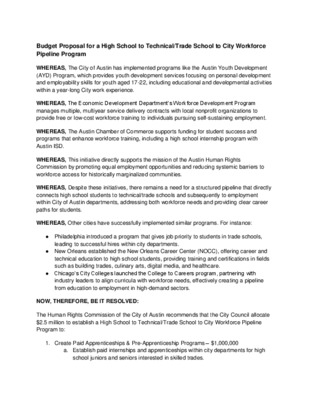Back Up Agenda Item 40_Proposal for a High School to Technical Trade School to City Workforce Pipeline Program from the Human Rights Commission — original pdf
Backup

Budget Proposal for a High School to Technical/Trade School to City Workforce Pipeline Program WHEREAS, The City of Austin has implemented programs like the Austin Youth Development (AYD) Program, which provides youth development services focusing on personal development and employability skills for youth aged 17-22, including educational and developmental activities within a year-long City work experience. WHEREAS, The Economic Development Department’s Workforce Development Program manages multiple, multiyear service delivery contracts with local nonprofit organizations to provide free or low-cost workforce training to individuals pursuing self-sustaining employment. WHEREAS, The Austin Chamber of Commerce supports funding for student success and programs that enhance workforce training, including a high school internship program with Austin ISD. WHEREAS, This initiative directly supports the mission of the Austin Human Rights Commission by promoting equal employment opportunities and reducing systemic barriers to workforce access for historically marginalized communities. WHEREAS, Despite these initiatives, there remains a need for a structured pipeline that directly connects high school students to technical/trade schools and subsequently to employment within City of Austin departments, addressing both workforce needs and providing clear career paths for students. WHEREAS, Other cities have successfully implemented similar programs. For instance: ● Philadelphia introduced a program that gives job priority to students in trade schools, leading to successful hires within city departments. ● New Orleans established the New Orleans Career Center (NOCC), offering career and technical education to high school students, providing training and certifications in fields such as building trades, culinary arts, digital media, and healthcare. ● Chicago’s City Colleges launched the College to Careers program, partnering with industry leaders to align curricula with workforce needs, effectively creating a pipeline from education to employment in high-demand sectors. NOW, THEREFORE, BE IT RESOLVED: The Human Rights Commission of the City of Austin recommends that the City Council allocate $2.5 million to establish a High School to Technical/Trade School to City Workforce Pipeline Program to: 1. Create Paid Apprenticeships & Pre-Apprenticeship Programs – $1,000,000 a. Establish paid internships and apprenticeships within city departments for high school juniors and seniors interested in skilled trades. b. Provide summer pre-apprenticeship programs for students exploring public works, electrical, HVAC, plumbing, cybersecurity, transportation, emergency services, and other high-demand fields. c. Offer stipends and tuition assistance for students enrolling in trade schools and certification programs at Austin Community College and local technical institutions. 2. Expand Dual Credit & Trade School Partnerships – $750,000 a. Partner with Austin ISD, Del Valle ISD, Manor ISD, and local charter schools to develop dual credit pathways that allow students to earn industry-recognized certifications before graduating. b. Fund equipment and training programs in high schools that align with City of Austin job needs (e.g., construction trades, IT and cybersecurity, automotive technology, public utilities). c. Develop a City-sponsored scholarship program to cover tuition and fees for students pursuing careers in essential technical fields. 3. Establish a “Guaranteed Job” Program with the City – $500,000 a. Create a structured pipeline where students who complete trade programs are fast-tracked into City of Austin jobs. b. Establish clear hiring pathways and mentorship programs to connect students with career opportunities in municipal government. c. Provide on-the-job training, career coaching, and job placement assistance for graduates entering the workforce. 4. Career Exploration, Outreach, and Community Engagement – $250,000 a. Launch city-wide career fairs and industry showcases to connect students with city departments and trade careers. b. Fund outreach and recruitment efforts targeting underrepresented student populations, including BIPOC and low-income students. c. Support family engagement initiatives to inform parents about technical and trade school opportunities as viable career paths. NOW, THEREFORE, BE IT FURTHER RESOLVED: The City of Austin will work with AISD, ACC, local trade schools, and industry leaders to ensure the pipeline program aligns with workforce needs. The City should track program effectiveness by measuring student participation, trade school enrollment, job placements, and retention rates in city employment. The City should prioritize equity by ensuring historically marginalized communities have access to these opportunities. By fostering equitable access to stable, well-paying city jobs, this program advances the Commission’s goal of eliminating discrimination and promoting economic justice for all Austin residents. The Human Rights Commission of the City of Austin recommends that the City Council allocate a total of $2.5 million to establish a structured High School to Technical/Trade School to City Workforce Pipeline, ensuring equitable access to employment opportunities within city departments and addressing workforce shortages in critical sectors.